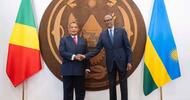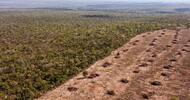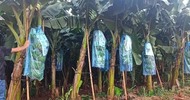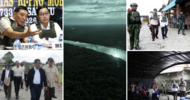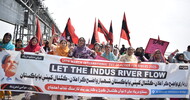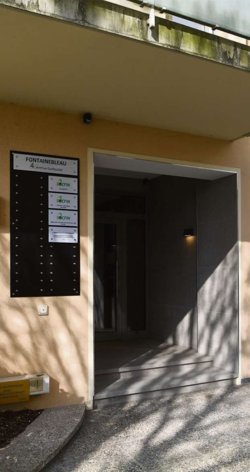
The global headquarters of Socfin, in a discreet building in Luxembourg. The multinational employs 40,000 people. (Photo: Alain Rischard)
(unofficial translation by GRAIN)
Socfin writes to Le Quotidien
In its 31 January issue, "Le Quotidien" reported information coming from NGOs about mortal violence occurring around the Socfin oil palm plantations in southeast Sierra Leone. Following the publication of this news, the Luxembourg-registered company controlled mainly by two businessmen - the Belgian Hubert Fabri and the Frenchmen Vincent Bolloré - sent us the following letter:
"The 'Le Quotidien' newspaper, on page 7 of its 31 January 2019 issue, reported on the tragic events that took place last 21 January in the Sahn Malen chiefdom, southeast Sierra Leone. According to your paper, it would seem that a number of employees of an oil palm plantation run by SAC, a subsidiary of SOCFIN, initiated a strike to 'protest against poor working conditions and low wages' (sic) on the one hand, and the seizure of more than 18 hectares of land at the expenses of local villagers on the other.
This social movement, according to your paper, started on 16 January and was extremely violently repressed by police as two people were killed, 15 others were arrested and 2,500 people fled to neighbouring villages.
These allegations are completely false.
Indeed, based on our inquiry, SOCFIN was able to determine that the cause of this violence stemmed solely from the conflict between two local personalities: Mr. Shiaka Sama, independent MP, who your article suggests was arrested in the context of a mobilisation that followed the strike of the SAC employees, and the Paramount Chief of the local chiefdom. This is completely untrue. The conflict stemmed only from Mr. Shiaka Sama attempting to a build a local office on a piece of land without informing the local authorities, that is to say the Paramount Chief. The situation grew tense after a group of young people, some of whom were armed, got involved and both the police and armed forces were called in.
These events, confirmed by one of the protagonists named above, unfortunately ended in two deaths, numerous injuries and thousands of people fleeing to the forest or nearby villages.
In other words, accusing SOCFIN of being the cause of these 'mortal clashes' is completely wrong. In fact, it's a lie and completely contrary to what our local investigation shows.
These accusations are made worse by the reference to so-called conflicts between SOCFIN and its employees or the local communities.
In fact, since October 2018, the Luxembourgish authorities would would have been notified of any violence likely to be occurring in or around the SOCFIN plantations.
It is clearly established today that SOCFIN had nothing to do with the unfortunate events of 21 January.
In addition, your paper took advantage of the fantasized version of what happened to remind people that SOCFIN has been accused many times of 'land grabbing' in the countries where it operates to produce palm oil and rubber in Africa and Asia.
Well, the High Court of Paris, in its now final decision rendered on 29 March 2018, found that such accusations are defamatory.
SOCFIN therefore finds it necessary to set the facts straight and declare that it has no connection to the unfortunate events that saddened Sierra Leone on 21 January."
RECTIFICATIONS: In its mail, entitled "Right of response", the Socfin company refers to an article published in the 31 January issue of Le Quotidien reporting on mortal clashes and other violent acts that occurred in January around the oil palm plantations run by the Luxembourgish company in Sierra Leone. Le Quotidien reported *in the conditional* facts that were relayed by 17 European NGOs, something that Socfin's mail fails to recognise. The company also fails to mention that Le Quotidien tried to reach it three times in order to gather its version of the events. Socfin did not reply to our efforts, which were repeated several times further, leaving us with no response. Despite this silence, Le Quotidien reported on Socfin's version of the story based on a communiqué that the company circulated exclusively in Sierra Leone.
Over the past 18 months, Le Quotidien sent six requests for an interview to Hubert Fabri, chairman of the board of Socfin. He never answered our requests - neither to say yes, nor to say no.
It's noteworthy that in its mail, Socfin does not challenge the facts reported by Le Quotidien, only their interpretation. It does this based on its own internal investigation, without waiting for the definitive results of the official investigation currently underway in Sierra Leone.
The 21 January clashes were provoked by a dispute between a parliamentarian and the traditional chief of Malen, the region where Socfin's plantations are located. Elected in 2018, independent MP Shiaka Sama is the former spokesperson of Maloa, an organisation of villagers living near the Socfin concessions who accuse the company of having grabbed their lands to establish its oil palm plantations covering 11,000 hectares.
This dispute degenerated into clashes between the communities and the police. This led to two young men being killed, and a brutal crackdown by the army and police. The people living in the nearby villages were brutalised and ransacked by security forces, causing 2,500 people to flee to nearby forests and villages. During these operations, Socfin put its four-wheel drive vehicles at the disposal of the army. These facts were corroborated by a mission of human rights defenders who visited the communities the days following the events.
Socfin seems to cast doubt, as well, on the point mentioned by Le Quotidien that Luxembourg's Foreign Affairs Ministry was alerted as of October 2018 of the risk of serious violence around its plantations in Sierra Leone. Le Quotidien maintains what it reported on this, which was confirmed by several sources.
Finally, Socfin considers it abusive to draw a link between these events and the accusations of land grabbing that the company is subject to since 10 years. The existence of these accusations in about 10 countries of Africa and Asia where Socfin operates has been established by some 40 NGOs, by the Luxembourgish, French and Belgian authorities, by a report from the European Parliament as well as by hundreds of press articles and audiovisual reports. The communities' complaint is also recognised in the decision of the French court issued on 29 March 2018 resulting from the lawsuit filed by Socfin against French NGOs and media. The judges found certain statements defamatory but recognised that they were used in good faith by the defendants and rejected all of Socfin's demands.






